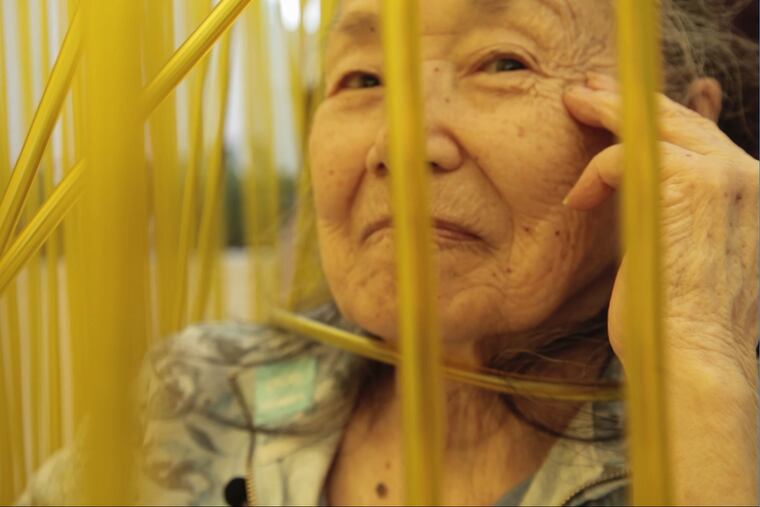BlackStar Festival films shine light on health equity
From dementia to maternal mortality, filmmakers debuting their work at the acclaimed annual festival shine a light on health challenges that disproportionately affect people of color.

When Rea Tajiri was living one of the greatest honors of her career, playing her first feature film at the Venice Film Festival, she also experienced something terrifying — her mother suddenly wasn’t sure that Tajiri was her daughter.
It was the first sign for Tajiri, a Philadelphia-based film director, that her mother was developing dementia. The following 18 years took Tajiri on a journey that was sometimes painful, and sometimes surprisingly delightful, as she cared for her mother until her death in 2015.
This weekend, Wisdom Gone Wild, a film Tajiri directed documenting that journey, will be playing at the annual BlackStar Film Festival — one of multiple films that will be shining a light on health-care experiences, access, and equity.
» READ MORE: 10 of the best things to do in Philly this weekend and next week
“I really wanted to work against this familiar narrative that would just end in a tragic story around dementia,” Tajiri said. “I wanted to instead look at the possibilities of other ways of knowing and connecting with someone who is elderly — connecting to their life experiences. This was very profound in the caregiving I did with my mother.”
At the beginning of her mother’s experience with dementia, Tajiri often tried to correct her — “No, this didn’t happen that way,” she would remind her mother. But eventually Tajiri learned to just go with her mother, even as she was changing her identities, and see what she was trying to convey. She ended up learning more about her mother than she had ever known.
“I really wanted to work against this familiar narrative that would just end in a tragic story around dementia.”
“She developed a really interesting life which was about her interests,” Tajiri said.
Tajiri’s mother declared she was a professor of art history, even though she had never gone to college. She proclaimed she was single and free, and had hitchhiked across Europe. Her deepest desires, passions, and interests were unleashed for her children to discover.
» READ MORE: 11th BlackStar Film Festival Weekend Highlights
Factual details about her life came out as well, including ones that were previously locked away due to traumatic memories. A Japanese American, Tajiri’s mother grew up in the farming community of Salinas, Calif. Tajiri learned details of her life growing up on the farm, such as what her family would eat on their low income, or that they were a part of the abundant Japanese strawberry-farming community in Northern California. She also learned more about her mother’s experience being incarcerated in one of the U.S. internment camps during World War II.
“I just learned different facets of her,” Tajiri said. “I felt like I had access to more of her inner life.”
As she searched for caregivers for her mother, Tajiri wanted to find a doctor of color who would better be able to connect with her mother’s experiences. Awareness and understanding of those details of her mother’s life ended up playing a significant role in understanding her behaviors as the dementia continued.
While Tajiri was able to find adequate care for her mother in California, which has many health-care options for its aging population, Pennsylvania is seen as woefully unprepared to meet care demands for its residents with dementia. There are 280,000 Pennsylvanians over the age of 64 living with Alzheimer’s disease, the most common cause of dementia, and 100,000 more with related disorders. As of last year, few state-licensed eldercare facilities have dementia-specific accommodations, with a maximum capacity of 17,157 patients between them.
Also playing at BlackStar is Aftershock, a documentary that tells the story of the U.S. maternal mortality crisis through those most hurt by it, and activists fighting for change.
» READ MORE: America’s racist maternal mortality crisis traces back to Philadelphia
One of the directors of the film, Paula Eiselt, felt called to raise awareness when she learned that the U.S. is one of the most dangerous industrialized countries to give birth in — and is three times more so for Black women than white women.
Philadelphia paints an even more dire situation: The maternal mortality rate exceeds the national average, and while Black women made up only 43% of births in Philadelphia between 2013 and 2018, they represented 73% of pregnancy-associated deaths in the same time period.
“We didn’t want to make a doom-and-gloom film — it’s very solutions-based,” Eiselt said. “The maternal mortality crisis is a very solvable crisis. We are an outlier in the developed world, not by mistake, but by design. It’s due to the systemic racism that’s built into the medical system.”
“We didn’t want to make a doom and gloom film — it’s very solutions-based.”
From integrating midwives and doulas with doctors for more patient-centered maternal care, to providing more access to health insurance for pregnant people and new parents, to guaranteeing postpartum support and maternal leave, Eiselt says there are plenty of actionable solutions to make the U.S. a safer place to have children.
“It’s a human right to have a safe and dignified birth,“ she said. “When you can choose where you birth, whom you birth with ... those things aren’t luxuries, it’s how you keep people safe.”
With the Supreme Court’s recent overturning of Roe v. Wade, Eiselt said the urgency around maternal health care is even more urgent, particularly for people of color.
“Maternity care is abortion care is health care — it’s the same thing,” Eiselt said. “In a country that has the highest maternal mortality rate in the developed world and the least support for moms and parents and families, and then you force people to be pregnant, the outcomes are going to be far worse.”